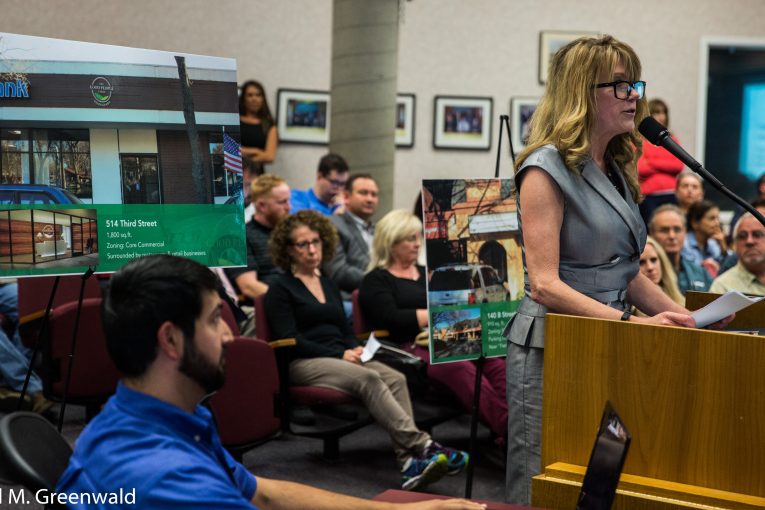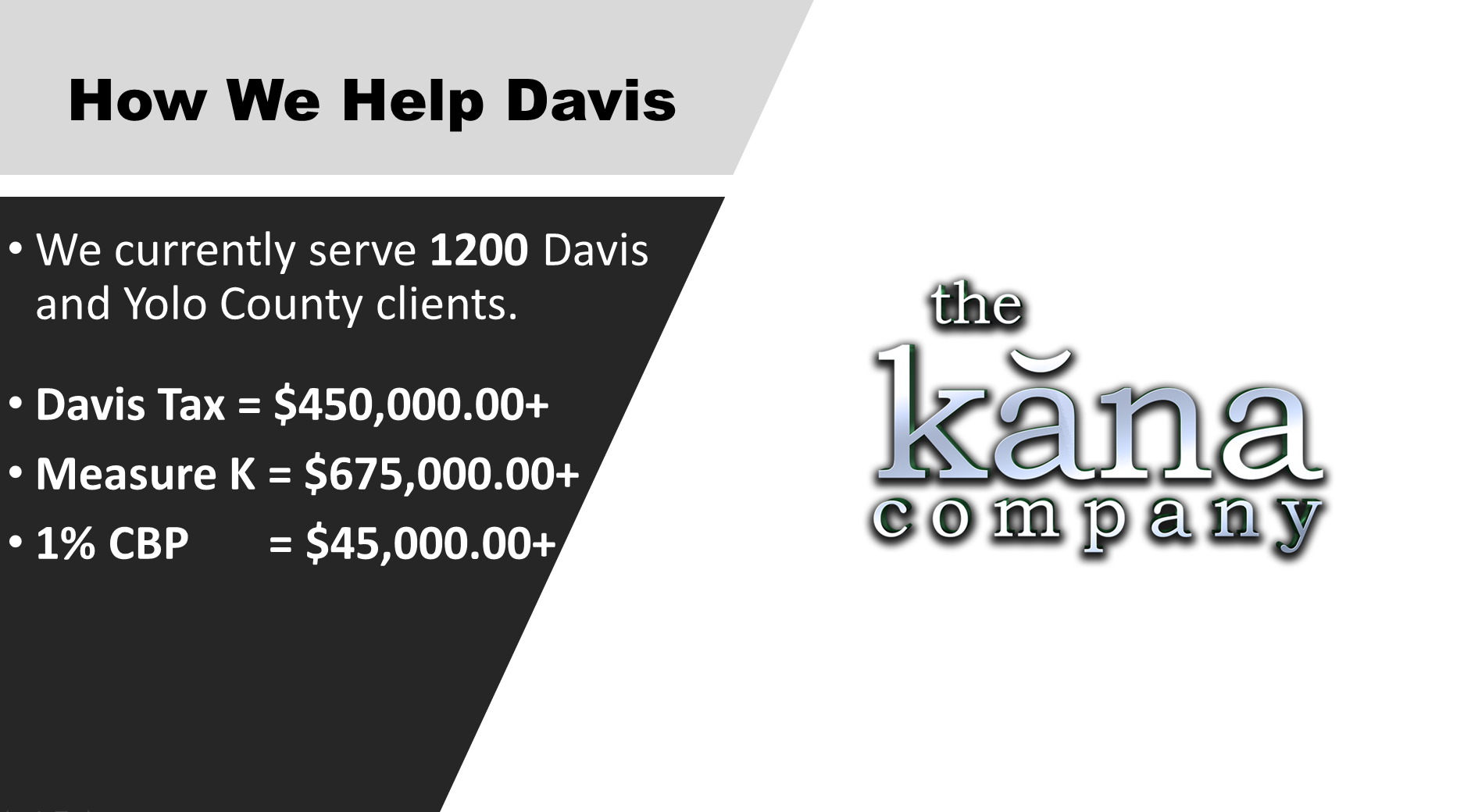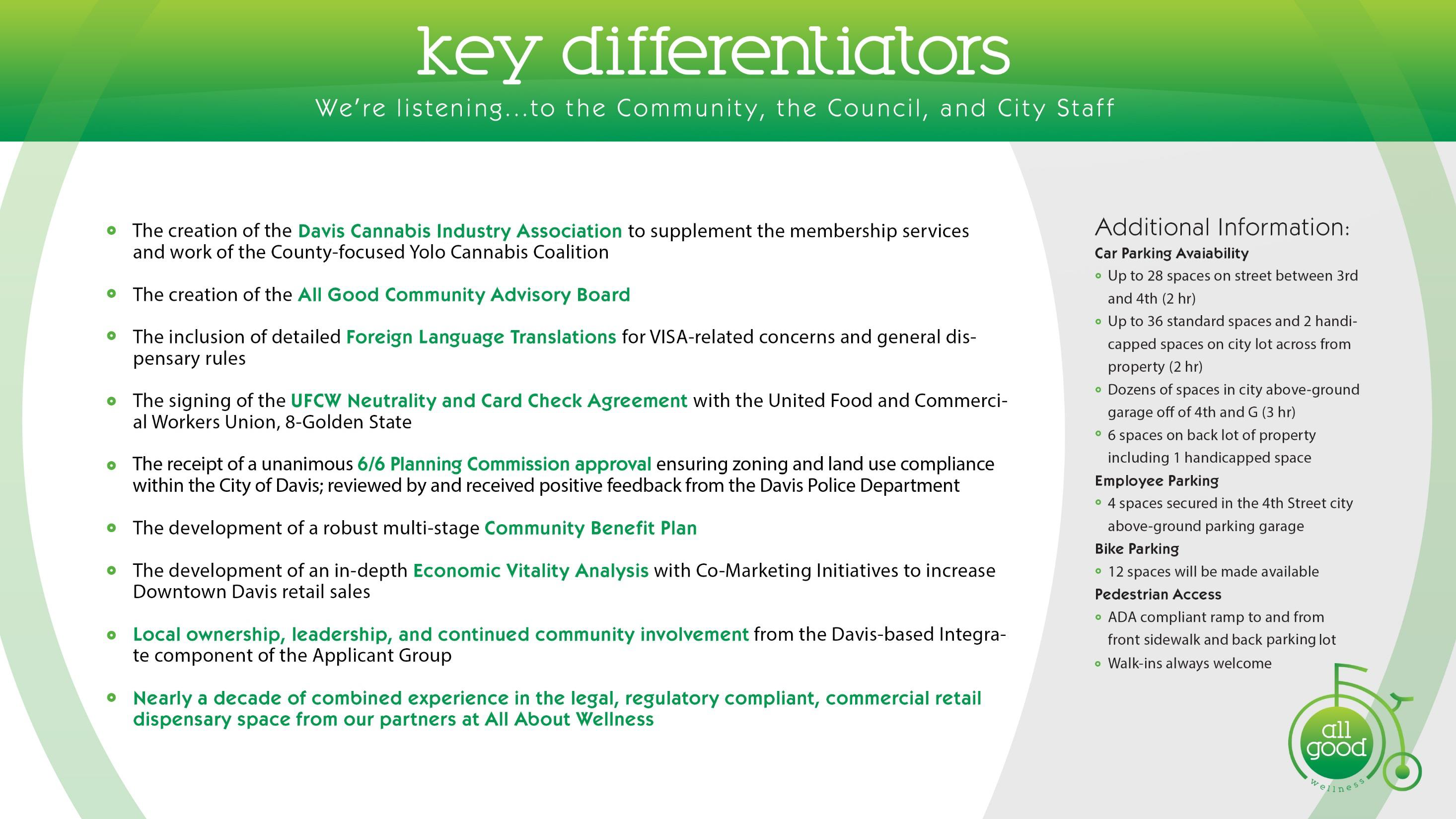

The Davis City Council on Tuesday watched as Rochelle Swanson recused herself, as her new business location now conflicts with one of the Olive Drive dispensary locations. They then listened to ten impressive presentations by the applicants.
By the end of the night, they added the possibility of going with five instead of four dispensaries, eliminated two locations and set the stage for May 29’s final approval. Gone from consideration was the Davis Cannabis Company, which did not have a representative show up to present their project, and the 140 B Street location for Good People Farms, as they had two locations and felt the 3rd Street location was the superior option.
The remaining 10 dispensaries gave seven-minute presentations, with Good People Farms combining their presentation for the two site locations.

California Grown by the Kana Company, a husband/wife team with 20 years of industry experience, have an application for 1605 2nd Street. They run three farms currently in Yolo County, with a combination of more than 200 acres.
Currently they serve 1200 Davis and Yolo County clients. They project that, if approved, they would generate about $450,000 in Davis taxes, with about $675,000 if Measure K passes and an additional $45,000 each year with the inflator.

Good People Farms is applying for a location on 514 3rd Street, right next to Newsbeat. The owner of Newsbeat, Janis Lott, came to endorse the project earlier during public comment.
In their presentation they talked about the Economic Multiplier and Halo Effect. They argue that there will be a 4x multiplier effect – with every dollar generated by consumers which they spend at  dispensaries, there will be another $3 of economic value injected into the local community.
dispensaries, there will be another $3 of economic value injected into the local community.
They cited states’ statistics to show an 8 percent increase in home property values, 15 to 30 percent increase in revenue to nearby businesses coming from dispensary clients, and higher than average tourism.
There is also a halo effect with a 33 percent decrease in opiate-related deaths in 13 states following the legalization of marijuana and $30,000 saved by preventing petty thefts.
Councilmember Will Arnold picked up on this point during his comments. He said, “I reject this notion that somehow these dispensaries are going to be havens for crime.”
He noted that there was a vandalism that occurred across the street from the 416 F Street location of the F Street Dispensary, and noted that had that dispensary been in place, the vandalism likely would have been caught on video and the perpetrator caught. He noted with irony that the owner of that location came out tonight in opposition to the F Street location.

Finally each of the applicants presented the community benefits. In some cases, these included improvements to sidewalks. In many cases, they offered benefits to local charities.
Several groups talked about labor agreements. River City Phoenix used this as a main selling point, but All Good Wellness talked about signing a UFCW (United Food and Commercial Workers) Neutrality and Card Check Agreement. This is something that the council heavily encouraged.
Mayor Pro Tem Brett Lee was the one councilmember who seemed to want to avoid the core, as he expressed concerns about parking.
“Track record and reputation, I think it’s important but it doesn’t necessarily have to be in the cannabis space,” Brett Lee stated.
He told his colleagues, “I am open to the idea ultimately of more than four applicants.” He suggested, “Some number more in short order.
“I imagine a phase two happening much sooner than 18 months,” he would add.
Brett Lee had a clear preference away from the core and pushed the two locations on 2nd Street and two on Olive Drive.
But the other members of council were more inclined toward “geographic diversity” and pushed more toward the idea of at least one location in the core.
Will Arnold said, “We have more than four great applications.” He said what he saw was “very serious people who have put together some incredible applications… We definitely have a very tough  decision to make later on this month.”
decision to make later on this month.”
He encouraged those applicants who had not done so to reach out to the United Food and Commercial Workers.
“The downtown area is obviously very unique, a very important part of our community,” he said. “I’m a little bit more optimistic that we can make these work in our downtown.
“Downtown is where we want to bring people,” he said. “So to me, saying that a place is going to bring a lot of people downtown is a good thing. That’s where we want to bring people.”
He cited the Good People Farms slide from above.
Councilmember Arnold cited people who are concerned that dispensaries will add to the problems of homelessness and petty theft. “The evidence that I’ve seen points to the exact opposite,” he said. “Around the dispensary, crime is being prevented.”
A lot of this has to do with the security measures and video surveillance that each dispensary is creating.
“Cannabis has been in Davis already, and has been for a long long time,” Lucas Frerichs said, noting that we are in for a major change as evidenced at the ballot box.
Like his colleagues, he was pleased to see so many exceptional applicants, “probably more than four.”
“Significantly tough decisions, but I think we’re up to that challenge,” he said.
He is looking at issues like zoning compatibility, geographic distribution (where he said he was okay with least one being located downtown, but not all of them), ease of parking important (but not absolute), community support, as well as previous experience and track record (not just in the industry). He also cited labor relation issues as being very important to him.
Finally Mayor Robb Davis said, “I am intrigued how you each really focused on that thing that is your core strength.”
He too listed some considerations.
“All those things are important,” he said. “It doesn’t make our job any easier.”
He pointed out, “This is the first time anyone in this room has lived in a situation where we went from prohibition to allowance of use of a previously prohibited product.”
He warned, “We need to be careful about helping people see that this thing is going to be okay.” He said, therefore, that the city’s approach of going slow is partly a product of that environment.
Mayor Davis said, “We have an opportunity to put a stamp on the way we want things to run in our community.” The issue of labor is important.
He said, “We do want to see these geographically dispersed.”
He echoed several of his colleagues by stating, “I’m open about getting one in the downtown.
“I’m not worried about parking,” Mayor Davis would add. He said that “we are very inconsistent.”
On the one hand, he said, we complain, “I can’t find parking. No one goes there because it’s all parked out. If it’s all parked out, where’s everyone at? We’re not just parking here and walking to Woodland.
“I’ve lived in the downtown, it is a thriving downtown,” he continued. “Yes, it has it problems, but I’ll take our downtown over pretty much any other downtown I’ve walked in for the last decade… The Cannabis industry coming into our downtown is not going to kill it… We can bring actual retail back into the downtown.”
So he said, “I’m very open to a downtown location.”
The council agreed to consider up to five spaces come May. That requires them to amend the ordinance, which would take 45 to 60 days according to City Attorney Harriet Steiner. That means they could approve a fifth dispensary but the conditional use permit would not take effect immediately.
They are now down to nine applicants, and they must eliminate at least four more at the next meeting.
—David M. Greenwald reporting
Hello readers – We are in the middle of one of the most interesting and exciting election years in recent history. The Vanguard is bringing the election coverage like no one else. And we’ve brought on some additional help just to make sure we cover everything. We need to raise $1000 this month to help cover the bills. It’s a small campaign, but necessary. If you support our work – please donate a little bit to help us out.
To donate, hit this link: https://www.gofundme.com/may-vanguard-fundraiser

Although I don’t dispute the comments of the Council members, it was interesting to hear comments from downtown business owners in recent months while I was conducting due diligence on this issue as a planning commissioner. Some business owners expressed concern about the decline in downtown retail foot traffic during the past few years (especially during the afternoon, before evening restaurant and bar activity starts). Some said that anything that could increase downtown foot traffic would be welcome. The more I looked into the subject, the more it became apparent that dispensaries don’t contribute to loitering, higher numbers of the homeless, vagrancy, etc. Simply put, dispensary products are too expensive (including taxes) to attract anyone other than those with the means to make purchases. I think a combination of downtown and periphery locations would be beneficial; a 2nd Street location, for example, could facilitate access by those traveling on I-80 from other cities that don’t have dispensaries, whereas a downtown location would be convenient to Davis residents while they visit downtown to shop, etc. I concur that the City should consider more than 4 dispensaries after an evaluation of the experience with the first 4 sites. Overall, the City Council and staff set up a very good, detailed and thorough procedure for soliciting and evaluating dispensary proposals. From the perspective of a planning commissioner, it was a very interesting process. (Full disclosure, I am speaking solely for myself, not in behalf of the entire planning commission.)
For full disclosure, Greg… you are walking a fine line… what you call ‘due diligence’ could be construed as ‘inappropriate behavior’, given your role… a juror who does their own investigation has tainted many a trial… from what you describe, as long as you fully shared the results of your inquiries, in the public forum (Planning Commission meeting), “no harm, no foul” in my opinion…
But it is a fine line…
I have a great disagreement with this.
The issue of the court of law is that there are rules of evidence that a judge determines what gets in and the defense gets to confront. When a juror goes outside of the court structure, it denies the defense a chance to confront evidence. That’s a problem.
In this case, PLanning Commissioners are not even the deciders. So ex-parte communications are not a huge concern. A number of commissioners openly stated at the March 28 meeting that they had toured dispensaries and gathered information . There is nothing remotely improper about that.
Indeed the councilmembers did the same thing. There are no rules of evidence precluding that. There is nothing remotely improper.
You apparently missed,
Whatever…
Howard, in point of fact, former Community Development Director Ash Feeney strongly suggested and urged that Planning Commissioners can and should endeavor to learn as much as possible about all projects scheduled to come before the Planning Commission. This includes meeting with project proponents and attending site tours. As an example, I met with the Lincoln40 developer and toured the site with him–all with the explicit support and approval of Mr. Feeney. Most of the other Planning Commissioners conducted multiple tours of the proposed cannabis sites, including touring existing medical dispensaries in Sacramento whose operators are among the local proponents. When the Planning Commission held its public hearing on the dispensaries, I fully disclosed the fact that I had visited all 13 sites and took tours at 5 of the sites. The other 5 commissioners also in attendance that night likewise discussed their experiences touring the proposed sites.
As a member of the Chamber of Commerce’s Government Relations Committee I have seen detailed presentations by four of the applicants. Based on those presentations, and the information shared last night by the City and the applicants, I concur wholeheartedly with all the points that Greg has made above, and I felt the same way as the Council did … that four is not a magical number.
What I would like to see is more information on what the size of the total market is for Davis. That will help the Council and the community make a more informed decision.
These are good points – size of the market is an important question.
I have met with a bunch of the applicants and learned some interesting things.
First, Davis is the only city in the county allowing dispensaries which means that we will draw countywide not just citywide
Second, I was interested to learn that the biggest consumer are baby boomers rather than millenials
Third, they actually have a lot more near Sonoma State and do a tremendous volume of business. The belief by some is we are greatly underestimating the market, but I think that is the critical question.
“I was interested to learn that the biggest consumer are baby boomers rather than millenials”
I believe this may, at least in part be driven by the medical needs of aging boomers. I know when I was in excruciating pain from a bulging disc completely blocking a nerve, I would have preferred marijuana to opioids for pain relief if it had been both legal and readily available at the time. As it was, since I hate opioid side effects, I used strict bedrest, Motrin, and bit the bullet until steroids, rest, and then specific exercises worked. It took three months. Long enough to develop opioid addiction had I chosen that route.
Tia may think that pot use by boomers is “driven by the medical needs of aging boomers” but I think it is driven by the biggest generation of stoners that has ever (and probably will ever) live. Anyone who went to the many “Days on the Green” in the 70’s and 80’s where pretty much everyone was smoking pot (and often wearing tie die “If you can remember the 1960s, you weren’t really there” T-Shirts) will tell you that no generation smoked the amount of pot that boomers did
https://en.wikipedia.org/wiki/Day_on_the_Green
P.S. A friend that runs the IT department for a big downtown law firm said that since electronic document delivery has almost eliminated the need for “bike messengers” that most of the hipster guys riding bikes making deliveries to the boomers at big law firms and investment houses are not “bike messengers” but “drug dealers on bikes” (who will see a big drop in business when boomers can just walk down to the local pot store)…
I think it’s a combination of the two personally
“The owner of Newsbeat, Janis Lott, came to endorse the project earlier during public comment.”
I would like to commend Janis Lott. It is unusual in my experience to have a public figure ( defined broadly to include members of the business community) come forward to explain and expand upon a change in position. Janis clearly approached this issue with an open mind and willingness to seek information beyond her starting position. This takes curiosity, integrity and courage to explain the evolution of one’s thinking. My respect, Janis.
My respect also to the minority who continue to have reservations and were courageous enough to express those in the face of a differing majority view.
This is part of what I love about Davis. The willingness to engage and express our opinions and the willingness to hear each other in an open forum.
That’s pretty broadly defined.
I’ve always preferred the side of Davis that goes over their public comment speaking limit and keeps talking until the meeting is shut down, yells comments at public speakers and council-members, and angrily confronts people they disagree with in the foyer.
““The evidence that I’ve seen points to the exact opposite,” he said. “Around the dispensary, crime is being prevented.”
Having attended some of these presentations, visited Boulder and read articles on the pros and cons of both medical marijuana and its means of distribution, I agree that crime, with the possible exception of graffiti does appear to decrease in the areas immediately adjacent to the dispensaries. If the downtown is our highest area of crime, I would suggest a couple of dispensaries in the core area as the most protective locations. Unfortunately, what I did not hear is the police perspective on optimal areas from their perspective. I may have missed it.
The fact that you don’t hear the police complaining about it, is itself telling
C’est vrai…